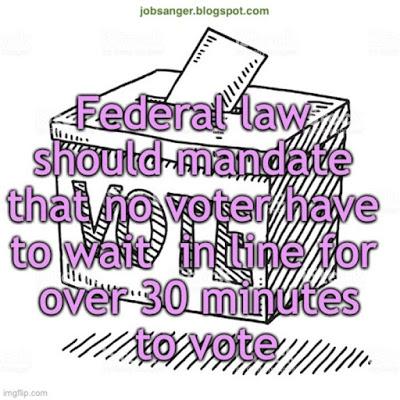 Much has been made of Republican attempts to pass new laws to suppress the votes of those who might vote against them (minorities, young people, etc.).
Much has been made of Republican attempts to pass new laws to suppress the votes of those who might vote against them (minorities, young people, etc.).But little has been said recently about a voter suppression effort by Republicans that is already in place, and affected many voters in the 2020 election -- having to wait in line for hours to vote.
This primarily affected minorities. In White precincts, there were lots of voting machines and no one had to wait very long to vote. But in minority areas, there were few precincts and few voting machines, and people were forced into lengthy waits to be able to vote.
This mostly happened in states where Republicans controlled the voting process, and although they deny it, seems to be an obvious effort to suppress the votes of minorities. This needs to be rectified. A federal law should be passed to mandate that no voter have to wait in line over 30 minutes to vote -- and any state violating that law should be severely punished (and required to fix the problem before the next election happens).
Here is some of what Jennifer Rubin had to say on this subject in The Washington Post:
The Democracy Fund’s Voter Study Group completed a voluminous study of the 2020 election. Among its most stunning findings: “Sixty-two percent of white, 47 percent of Black, and 51 percent of Hispanic voters waited 10 minutes or less to vote; 7 percent of white, 13 percent of Black, and 8 percent of Hispanic voters waited an hour or more.” Put differently, “Almost twice as many Black (31 percent) as white (18 percent) or Hispanic voters (17 percent) reported waiting 31 minutes or more.”
The Brennan Center for Justice’s study of the 2018 midterms also showed: “Latino and Black voters were more likely than white voters to wait in the longest of lines on Election Day: some 6.6 percent of Latino voters and 7.0 percent of Black voters reported waiting 30 minutes or longer to vote. ... More generally, Latino voters waited on average 46 percent longer than white voters, and Black voters waited on average 45 percent longer than white voters.”
Similarly, a Georgia study of the June 2020 primary found that “the average wait time after 7 p.m. across Georgia was 51 minutes in polling places that were 90% or more non-White, but only 6 minutes in polling places that were 90% white.”
The 30-minute mark is critical. The bipartisan Presidential Commission on Election Administration declared in a 2014 report that no voter should have to endure more than a 30-minute wait. The causes for the excessive wait times in Black precincts include fewer polling places, misallocation of resources and older machines.
Several measures might address the problem. The Justice Department could start filing suit against states with significant disparities in waiting times between White and Black voters. Congress could pass a law requiring states to adhere to the 30-minute rule. Voting rights litigator Marc Elias explains how this might work in a post for Democracy Docket: “If the state or a locality fails to meet this time limit, it must pay the affected voter for the time the voter spent waiting in line in excess of 30 minutes. Voters could seek the actual cost to them of waiting in line (lost wages, childcare, etc.) or accept an hourly minimum that each state could set by law.” Alternatively, states could be mandated in subsequent elections to increase the number of polling places or increase early voting and mail-in options.
Reduction of wait times should theoretically be agreeable to both parties and all voters. It has nothing to do with “voter security,” and everything to do with eliminating barriers to voting. If Senate Republicans will not agree to even reduction-in-waiting-time measures, perhaps Manchin will finally lose patience and agree to prioritize voting rights over Senate procedures.

